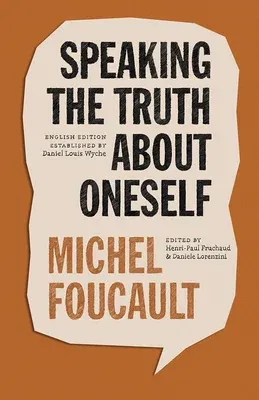Michel Foucault
(Author)Speaking the Truth about Oneself: Lectures at Victoria University, Toronto, 1982Paperback, 19 June 2023

Temporarily out of stock
Free Delivery
Cash on Delivery
15 Days
Free Returns
Secure Checkout

Part of Series
Chicago Foucault Project
Print Length
304 pages
Language
English
Publisher
University of Chicago Press
Date Published
19 Jun 2023
ISBN-10
0226826457
ISBN-13
9780226826455
Description
Product Details
Author:
Book Format:
Paperback
Country of Origin:
US
Date Published:
19 June 2023
Dimensions:
21.59 x
13.97 x
3.05 cm
Genre:
Ancient (To 499 A.D.)
ISBN-10:
0226826457
ISBN-13:
9780226826455
Language:
English
Pages:
304
Publisher:
Series: